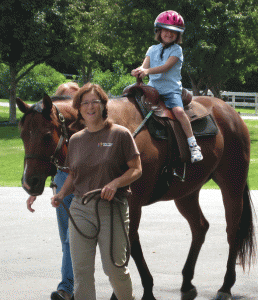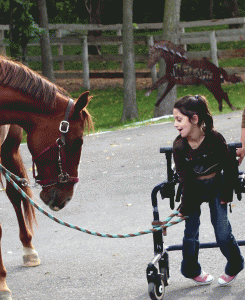Alternative therapy offers benefits for children with special needs
By TAMAR FENTON
A number of local Jewish families are extolling the benefits of a treatment strategy called hippotherapy, which uses the movements of live horses to aid children with developmental disabilities and other medical conditions.
Occupational therapist Janet Weisberg is the owner and director of Hold Your Horses, LLC, a private therapy practice that specializes in hippotherapy. Located in Independence, about 20 minutes south of Minneapolis, Hold Your Horses provides a team for each client that includes a therapist, aide, horse handler and horse.
“I treat clients much like I would in a traditional clinical setting but have the opportunity to facilitate change and skill development using the movement of a horse and the vibrancy of its environment,” Weisberg said.
The goal of hippotherapy is not to teach clients how to ride; it is about building skills for an improved quality of life.
The American Hippotherapy Association (AHA) defines the practice as “a physical, occupational and speech-language therapy treatment that utilizes equine (horse) movement as part of an integrated intervention.”
Heidi and Brian Pergament’s daughter, Pearl, is a third grader at the Amos and Celia Heilicher Minneapolis Jewish Day School and has cerebral palsy. Heidi Pergament heard that hippotherapy might be good for Pearl when she was a toddler and initially drove her to St. Cloud for the only program that had an opening. Eventually Pearl started working locally with Weisberg.
When the Pergaments realized how beneficial riding was for Pearl, they bought a farm so that the whole family could participate in horseback riding together, and Pearl could intensify her therapy opportunities. Seeing the benefits to Pearl and having such a great facility, the Pergaments opened up their farm to other families of special needs children by inviting Weisberg to use their facility in Independence to create a home base for Hold Your Horses.
“Traditional therapies are not always fun for kids; but hippotherapy produces positive results and Pearl loves it,” commented Heidi Pergament. “Riding horses is just part of who Pearl is at this point. It has helped her improve physically, emotionally and socially.”
Pergament added that her daughter “really connects with the horses. We know that riding and working with Janet give her a sense of comfort and increased confidence. She definitely has gained muscle strength and she does her best verbalizing when she is on the horse.”
The diagnoses under the broad category of “special needs” include everything from cerebral palsy and seizures to attention deficit hyperactivity disorder (ADHD), autism spectrum disorder (ASD), Down syndrome and other neurological, emotional and physical disabilities.
Many children living with special needs are able to improve their quality of life, mobility and social skills, as well as their chances for greater independence and success with the help of speech, occupational and physical therapy — and hippotherapy.
Weisberg was quick to note, however, that traditional forms of occupational therapy are beneficial for a wide range of skill development, and she works with her clients to ensure that they are informed about other treatment settings that could benefit their children as well.
Devra Goldstein is 19 years old and lives with neurological and physical challenges. At six months of age, she began having seizures that resulted in a loss of speech, an inability to walk unsupported and other developmental delays. Her parents, Ron Goldstein and Susan Freeberg of Plymouth, enrolled her in a therapeutic horseback-riding program when she was three.
“Hippotherapy has improved Devra’s muscle tone and her ability to walk… and her communication skills,” Ron Goldstein said. “She doesn’t talk, but when she is riding, she uses hand gestures, eye gaze, and moving the reins to communicate what she wants… When she rides, she is alert, involved, and doesn’t stop smiling. And all the while she is gaining physical and emotional benefits.”
Ron Goldstein believes that the horses are the perfect animals to help these special children.
“A well trained therapy horse understands the limitations of the rider and will work with them,” he said.
Six-year-old Dinah Hunegs has apraxia, which affects her brain’s ability to control her muscles. This condition has also affected her speech, as well as her gross and fine motor skills. Her doctor suggested hippotherapy as a way to help stabilize her and develop greater core strength.
“Dinah immediately loved the experience,” her mother, Jenifer Robins, said. “It was funny to watch my child, who is terrified by even tiny dogs, kiss the horses right on the lips or hold out her hand as the horse gobbled up the apple she would insist on bringing each week.”
Robins noted that her daughter, in less than a year, had become “strong enough and confident enough on a horse that she rode by herself on a trail ride during a family vacation in Colorado.”
Robins added that the emphasis on safety and tailoring each session to the client’s unique needs is evident.
“Janet is very patient and nurturing with the students,” she said. “She is knowledgeable about her students’ diagnoses and the effective tools for helping each child.”
Hippotherapy can also provide an opportunity for children with special needs to interact comfortably with their peers and gives the riders a sport that they feel confident doing.
Eight-year-old Sascha Paisner has an autism spectrum disorder. According to her mother Jamie, of Golden Valley, riding and swimming are the only activities that help Sascha feel confident in her abilities.
“She has some anxiety participating in other sports because of delays in her balance and coordination, but she thrives and is successful when she is on a horse,” Jamie Paisner said. “Therapeutic horse riding also gives her something to talk about that others are interested in and that they understand. This creates better and more successful social interactions for Sascha, who needs consistent practice in this area.”
The parents praised Weisberg as a warm and talented therapist who has created individual therapy programs that provide the greatest positive impact for each child.
“As a parent, I love to see my children happy and feeling successful,” Jamie Paisner said. “This really makes Sascha happy.”
***
For information about hippotherapy and Hold Your Horses, contact Weisberg at 763-595-7112 or e-mail:Â janet@holdyourhorses.org.






















Pleased to say people around the world care about autism and asd